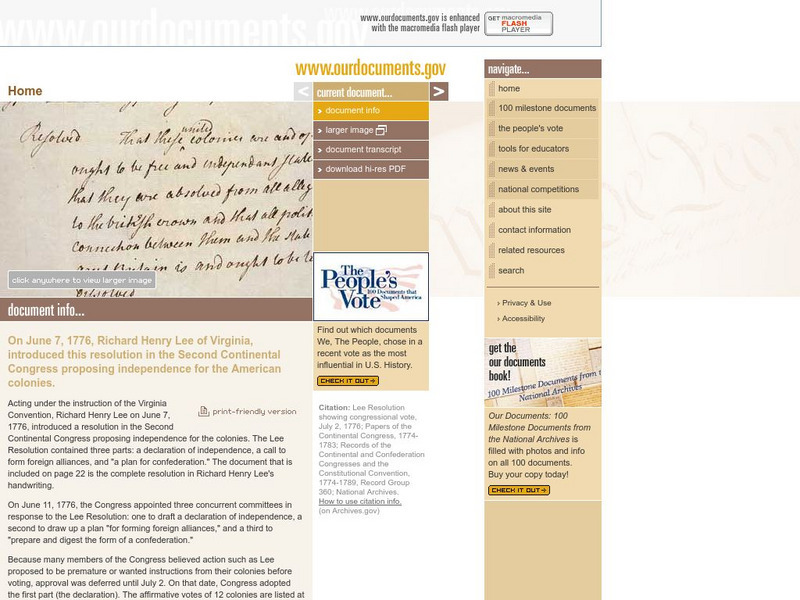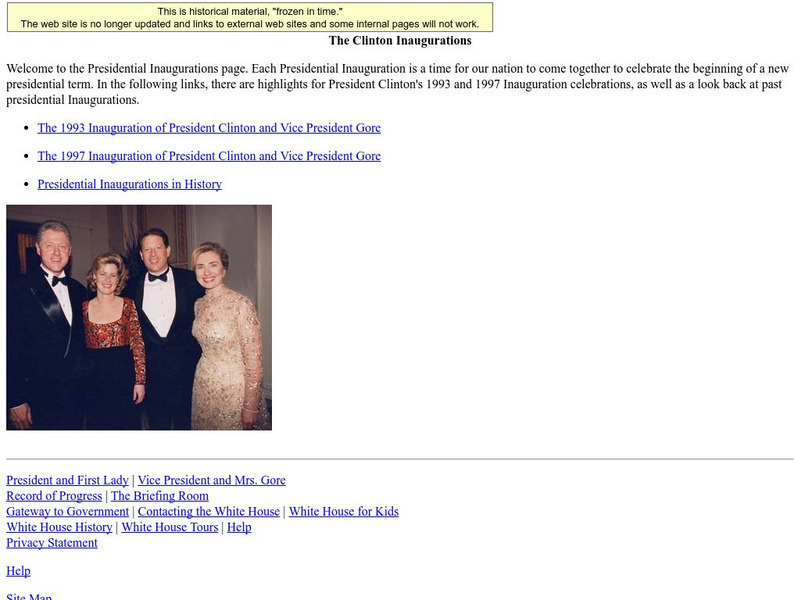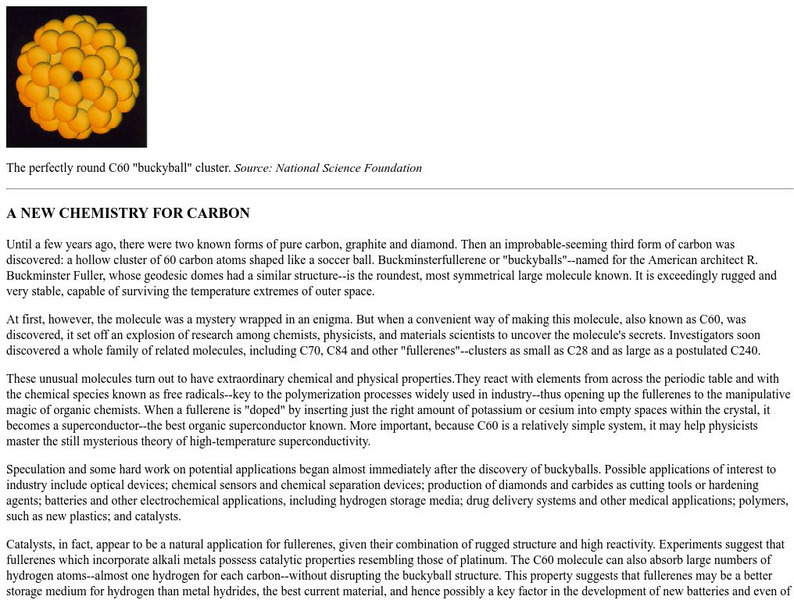US National Archives
Our Documents: National Labor Relations Act (1935)
Explore the original document that established the National Labor Relations Board written in 1935. Also known as the Wagner Act, its intention was to give employees the right to form unions and to engage in collective bargaining.
US National Archives
National Archives: Constitutional Issues: Watergate and the Constitution
This lesson plan deals with the constitutional issue of indictment and impeachment of a U.S. President. Includes original documents and related teaching activities.
US National Archives
National Archives: Was Reconstruction a Revolution?
Students will use primary sources to answer the question "Was Reconstruction a Revolution?". Included are discussion questions, worksheets, primary sources, extension activities, and additional resources. [PDF]
US National Archives
National Archives: Congress and Harriet Tubman's Claim for a Pension
Harriet Tubman is best known for the Underground Railroad, but she also served critical roles in our federal government during the Civil War and requested a federal pension for her work. Congress debated whether or not to extend to her a...
US National Archives
Nara: Teaching With Documents: Petition to u.s. Senate
Take a look at a 1917 anti-suffrage petition submitted to Congress by the Anti-Suffrage Party of New York that this site provides from the National Archives and Records Administration (NARA).
US National Archives
Nara: Teaching With Documents: Woman Suffrage and the 19th Amendment/lessons
This National Archives and Records Administration site briefly discusses the background of the 19th Amendment and offers primary sources, activities, and links to related web sited for educators and students.
US National Archives
Nara: New Directions in Retirement Income
"New Directions in Retirement Income: Social Security, Pensions and Personal Savings, Testimony by Commissioner of Social Security," Kenneth S. Apfel before the Senate Committee on Finance, July 22, 1998.
US National Archives
Nara: The Clinton Inaugurations
This National Archive and Records Administration site details the day Clinton and Gore were sworn into office. Includes pictures and captions; however, some pictures have been removed from the site.
US National Archives
Herbert Hoover Presidential Library: Exhibit Galleries: The Wonder Boy
Learn why Calvin Coolidge dubbed Hoover, then secretary of commerce, "the wonder boy" and why Hoover's active interest in scientific research, safety regulations, industrial standardization, radio, flood prevention, and other...
US National Archives
Herbert Hoover Presidential Library: Hoover Timeline
Learn about the highlights of Herbert Hoover's life with this visual timeline.
US National Archives
Nara: A New Chemistry for Carbon
This National Archives and Records Administration site describes the discovery of fullerenes, a new allotrope of carbon. The chemical properties of fullerenes, their uses, and possible potential as catalysts or superconductors is mentioned.
US National Archives
Nara: Clinton: Eight Years of Peace, Progress and Prosperity
The National Archives and Records Administration (NARA)presents "Eight Years of Peace, Progress and Prosperity Report," the official assessment of the Clinton presidency and its accomplishments assembled by the Clinton-Gore staff.
US National Archives
Nara: Presidential Facts: Clinton
This NARA short site gives the basic facts of President Clinton. Some facts include his birthdate, his favorite food, heroes, favorite books, most memorable day, etc.
US National Archives
Pioneering Journals of the Ingalls Family: Pepin, Wisconsin: Household Chores
Based on journals for Laura Ingalls Wilder's family, these descriptions of housework in a pioneer home are typical of the life of most pioneers on the prairie or in the northern woods. These chores would have been "women's work."
US National Archives
Nara: Pcast Principles
This National Archives and Records Administration site, provides access to PCAST Principles: Executive Office of the President, President's Committee of Advisors On Science and Technology, Washington, D.C. 20500 (June 18, 1996). The...
US National Archives
Nara: Welfare Reform
The National Archives and Records Administration provides information on the Personal Responsibility and Work Opportunity Reconciliation Act of 1996 and provides access to available federal information.
US National Archives
Ronald Reagan Presidential Library: Archives: The Reagan Presidency
An overview of Ronald Reagan's presidency, with summations of his economic policy, domestic policy, foreign policy, and legacy.
US National Archives
Nara: The Magna Carta
One of the historical events that led to the creation of the limited government of the United States, the Magna Carta was written in 1215 as a promise from King John of England to his demanding barons. It put English kings under the rule...
US National Archives
Nara: Founding Fathers: North Carolina
Gives biographical details on the five delegates from North Carolina to the Constitutional Convention: William Blount, William Richard Davie, Alexander Martin, Richard Dobbs Spaight Sr., and Hugh Williamson.
US National Archives
Nara: Founding Fathers: New Jersey
Gives biographical details on the five delegates from New Jersey to the Constitutional Convention: David Brearly, Jonathan Dayton, William C. Houston, William Livingston, and William Patterson.
US National Archives
Nara: Founding Fathers: Connecticut
Gives biographical details on the three delegates from Connecticut to the Constitutional Convention: Oliver Ellsworth, William Samuel Johnson, and Roger Sherman.
US National Archives
Nara: Founding Fathers: Massachusetts
Gives biographical details on the four delegates from Massachusetts to the Constitutional Convention: Elbridge Gerry, Nathaniel Gorham, Rufus King, and Caleb Strong.
US National Archives
Nara: Founding Fathers: Pennsylvania
Gives biographical details on the eight delegates from Pennsylvania to the Constitutional Convention: George Clymer, Thomas Fitzsimons, Benjamin Franklin, Jared Ingersoll, Thomas Mifflin, Gouverneur Morris, Robert Morris, and James Wilson.
US National Archives
Nara: Founding Fathers: Delaware
Gives biographical details on the five delegates from Delaware to the Constitutional Convention: Richard Bassett, Gunning Bedford, Jr., Jacob Broom, John Dickinson, and George Read.








